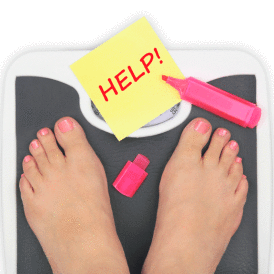I had been overweight my entire life. But after the birth of my second daughter, things truly got out of control. According to my scale, I was the heaviest I’d ever been. None of my clothes fit. And aside from feeling the typical new-mom exhaustion, I was feeling sloppy and depressed. In an effort to cheer me up, my mother came over with an old video of my first birthday. All of us—my mom, my eldest daughter, my “skinny husband” and me, nursing the baby—sat on the couch to watch. There on the screen we saw a chubby, curly-haired little brunette in a white dress. I thought I looked cute. But Skinny Husband, who I’m sure had no malicious intent, looked from the screen to me, and back to the screen and said, “Oh, look dear. You were fat even then.”
My heart sank and that familiar feeling rumbled in the pit of my stomach. I wasn’t mad, but embarrassed. Like a teenager on a bad date. Like I wanted to crawl under the coffee table and die. But this time something was different. A fire deep inside me had been ignited. That very day, I made a commitment with myself to never feel ashamed again because of my weight. I joined Weight Watchers and lost 64 pounds—almost 37 percent of my body weight—during the next 18 months. More than four years ago, thanks to my weight loss success, I became a Weight Watchers leader and have encountered thousands of women who want to make a similar change. I’ve noticed that sadly, most of those who enroll in the program don’t achieve their goals. But those who do succeed—and the women I know who find success with other health-and-fitness programs—have something in common: They’ve been able to conquer the often-debilitating mental hurdles that contributed to their weight gain in the first place.
If you’re finding yourself ready to finally take control of your weight and wellbeing, here are some important mental exercises that can help you stay on the path toward change.
Get over yourself. We set our own boundaries and limitations for change without even being aware of it. But our current definitions of ourselves don’t have to predict our future. On the contrary, in order to execute change, we must inherently alter how we define ourselves. For example, if in the past you were told or believed you couldn’t run, that doesn’t mean you can’t be a runner now or in the future. Being told that you are the “heavy sister” doesn’t dictate that you must continue to be overweight. People who successfully change are willing to create a new paradigm about who they fundamentally are. A by-product of change is fear, and how we react to fear ultimately determines our success. Recognize when you are scared and embrace fear while using it to propel you forward, rather than letting fear control you like you’ve done before. In the past, you may have worried about people’s comments if you ordered a special meal at a restaurant, so you just chose off the menu—letting fear control you. In the future, the world won’t end if you become a runner or the “thin sister.” In fact, the world—and you—may be better off.
Set a reasonable goal. If you get into a car with no end-point in mind, you’ll get nowhere. You’ll also get nowhere if you try to execute change without an objective. If you want to reach your weight-loss destination, you need to start the journey with a realistic, clear-defined goal. Trying to lose 20 pounds for your high school reunion that’s a month away is probably not realistic. The goal should be achievable, but also specific. Think back to the last time you said, “I want to lose weight” or “I want to exercise more.” You probably didn’t succeed because those goals were too vague. A goal must also be within your control. If your goal is to get your husband to stop eating ice cream so you’re not tempted, and he eats Ben and Jerry’s every night and refuses to stop, this goal is not within your control. We cannot control others, only our own responses.
Don’t be your own worst enemy. We are harder on ourselves than we would ever be on anyone else. Few would tell their best friend that they are “too fat” or that they are “bad” for having three Oreos. This type of condemnation chips away at our self-esteem and creates doubts about our ability to succeed. We often take care of ourselves last. As women, we are indoctrinated to believe it’s our “job” to take care of our families first. We’ve somehow walked away with the idea that we are selfish if we put ourselves first. The people I see who successfully change make the time for themselves to cook, exercise, socialize, reward themselves and do whatever they need to succeed. Realize that if you are healthier, it will benefit all the people you care about.
Pace yourself. The rate at which you try to change determines if you will ultimately succeed. Moving too fast toward your goal can cause you to stumble. If you start out as a non-runner and try to run a marathon within a month, there’s a good chance you’ll fail. Have you tried to lose weight before by becoming ultra-disciplined overnight? If so, you probably binged within a few weeks. Going too slow can also impair your success. If you lose only a quarter-pound a week, you’ll probably get discouraged and also end up binging. Ideally, pace yourself at a reasonable, achievable rate.
View the journey as a challenge, not a chore. No one wants to spend a lot of time doing something they hate or find boring. People who view what they need to do as a challenge instead of a chore are usually successful at change. They don’t despise having to eat low-calorie cookies. They view it a challenge to find the BEST low-calorie cookie ever! They completely change their past opinion that exercise is boring, and try new activities until they find something they really like. Making mundane activities fun is a key to sustaining change. Yes, it stinks that you have to lose weight. But your success depends on your outlook.
—Bari Berman is a weight loss coach with an MBA from the University of Chicago. She lives in the suburbs of Chicago with her skinny husband and her three daughters. In her free time, she enjoys running, cooking, playing with her girls and online shopping.





















2014/05/07 at 4:17 pm
Anyone who makes the decision to actually apply just a fraction of the pragmatic information Bari provides in her outstanding article will realize long-lasting life transformation! Thank you Bari!!!
2014/05/07 at 4:54 pm
Is it wrong that I was eating a Snicker cone while reading this article? Regardless I am inspired and will be consulting this article regularly to help inspire me. Looking forward to my elliptical workout today! Thanks Bari!